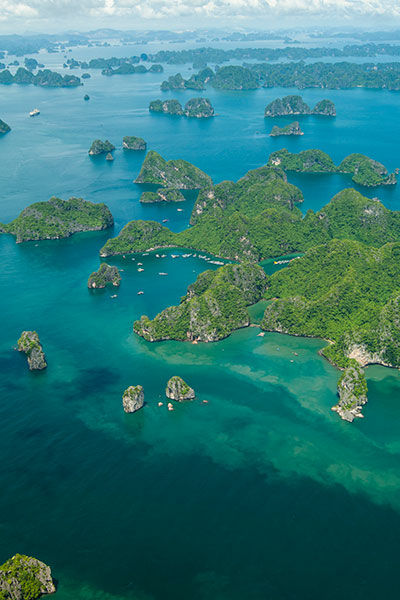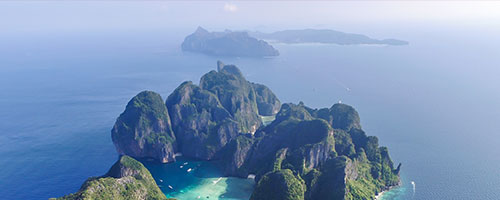VIETNAM (Update 15/08/2023)
Vietnam officially reopened to international tourism on March 15th, 2022, albeit under certain entry conditions.
Visa Conditions:
→ Visa Exemption:
- As of January 2022, passport holders from 25 countries WILL NOT need a visa for Vietnam with a minimum of 14 days.
- Starting 15 August 2023, Tourists from 13 countries who are unilaterally exempted from visas by Vietnam can extend the duration of their stays from 15 to 45 days; these countries include (Belarus, Denmark, Finland, France, Germany, Italy, Japan, Norway, Russia, South Korea, Spain, Sweden, and the U.K)
- The required 30-day interval between 2 stays with visa exemptions has been removed.
- The visa-free stay period starts on the date of entry.
→ E-Visas:
- From 15 August 2023, Vietnam will grant e-visas to citizens of 199 countries. Travelers can apply for a 90-day visa with single and multiple entries available.
- Here is a list of Ports of entry that allow foreigners to enter and exit Vietnam by E-visa. The list includes 13 international airports, 16 land border gates, and 13 sea border gates.
- E-Visas can be applied here.
Entry Conditions:
→ Before entering Vietnam:
- All Travelers must have medical or travel insurance covering COVID-19 treatment with a minimum liability of $10,000.
- A passport must be valid for at least six months following the arrival date in Vietnam.
→ At the international airport or Vietnamese border gates:
- At the point of entry, if passengers have symptoms of a SARS-CoV-2 infection, then they should immediately report to the health agency at the entry point
→ After entering Vietnam, Travelers must:
- They must self-monitor their health, and if they have any symptoms of SARS-CoV-2 infection, they must immediately notify the nearest medical facility for guidance and situation management.
- Children less than two years of age who are not required to be tested for SARS-CoV-2, have not been vaccinated against COVID-19, or have never been infected with SARS-CoV-2 are allowed to enter Vietnam and participate in activities outside the place of residence with their father, mother, and relatives.
- Travelers are advised to wear a mask in public and frequently disinfect their hands with an antiseptic solution such as hand sanitizer.
THAILAND (Update 04/04/2023)
Thailand lifted the remaining Covid-19 restrictions, bringing the country’s emergency declaration to a conclusion on October 01st, 2022. The country’s Centre of COVID-19 Situation Administration (CCSA) declared that the nationwide COVID-19 Emergency Decree would expire on September 30th, 2022, as the Kingdom reclassifies COVID-19 from a “dangerous communicable disease” to a “communicable disease under surveillance.”
Furthermore, as of October 01st, COVID-19-positive individuals in Thailand who show no symptoms are no longer required to self-isolate or show proof of vaccination. Instead, they will only be urged to wear masks and practice social distancing.
Thailand’s 45-day visa exemption is back down to 30 days for visitors from a list of 64 countries after several months. Starting from April 01st, 2023, visitors from mainland Europe, the UK, the US, Australia, Saudi Arabia, and other countries will only be granted a 30-day stay in Thailand if they choose to enter the country without obtaining a visa before their arrival, as the 45-day visa exemption is officially over. This policy change is a revision of the previous regulations before October 01st, 2022, when the 45-day exemption was implemented as a temporary measure to draw in more tourists until the end of March 2023. However, travelers will still have the option to extend their stay for an additional 30 days if they go through Immigration, meaning they can remain in the country for a maximum of 60 days.
Entry Conditions:
Before entering Thailand:
- A valid passport or a border pass for arrivals via border checkpoints.
At the international airport or Thailand border gates:
- Upon arriving in Thailand, all travelers must undergo entry screening, including a body temperature check, and present the required documents to the Immigration officer to conduct the reviews.
- The travelers will then be allowed entry and can go anywhere in the Kingdom.
- Travelers who arrive by land using a border pass can only stay no longer than three days within the specified areas.
During the Stay
While in Thailand, both vaccinated and unvaccinated/not fully vaccinated travelers are advised to follow health and safety standards strictly. Travelers who are experiencing COVID-like symptoms should get tested. If the results are positive, they must contact the appropriate medical treatment.
LAOS (Update 26/12/2022)
Laos announced that COVID-19 vaccination proof and Rapid Antigen Test (ATK) for unvaccinated travelers would no longer be required to enter the country. Travelers will not be required to show proof of vaccination or Covid-19 test results at any international airport, land border crossing, or port of entry in Laos.
Visas and Entry Requirement
- Tourist visas for those who require them are available on arrival and will shortly be available via the E-visa platform.
- Citizens of countries with a visa waiver scheme can visit Laos without requesting a visa.
- The passport should have at least six months of validity on entry into Laos.
- Additionally, airlines will now only allow boarding of flights to and from Laos if you have two blank pages in your passport.
- Visitors contracting or arriving with COVID-19 will be responsible for all treatment costs.


Procedure upon arrival
The procedure upon arrival is similar to how it was before the pandemic. All travelers must obtain the visa on arrival (unless they have an E-visa), collect their luggage, and enjoy their holiday!
Any questions about these regulations? Contact our sales team directly for support!
CAMBODIA (Update 03/10/2022)
The Royal Government of Cambodia has removed some health requirements for foreigners entering Cambodia.
- Remove the measures that require all foreign passengers, including land, sea, and air entrances, to show the passenger’s health declaration and the full COVID vaccination card or certificate upon arrival in Cambodia.
- Keep remote temperature checkers at the entry and exit gates and keep officers in charge at the border gates to check and advise passengers who have symptoms or patients.
The order applies to airports, waterways, and land border checkpoints with Thailand, Vietnam, and Laos.
In addition, The Kingdom has also announced that the Visa on Arrival (VOA) scheme has been reinstated, which applies to all travelers entering by air, land, and sea.
There would no longer be the requirement to wear masks in public areas and open spaces, and people could decide whether to wear masks there.
Entry Conditions
Before entering Cambodia
- Prepare documents for the visa on arrival.
At the international airport or Cambodia borders:
- Upon entry, travelers must apply for Visa on Arrival (VOA).
After entering Cambodia:
- They must self-monitor their health, and if they experience any symptoms of SARS-CoV-2 infection (fever; cough; sore throat; runny nose, stuffy nose; pain, fatigue, chills; decreased or lost taste; decreased or lost sense of smell; respiratory infections…), they must immediately notify the nearest medical facility for guidance and situation management.
MYANMAR (Update 05/08/2021)
Entry/Travel Conditions:
- Since February 01st, 2021, the Myanmar military has assumed control of the country, arresting the existing National League for Democracy party leaders and detaining them after declaring the results of the November 2020 general election invalid
- The military said a year-long state of emergency and banned all international travel.
- Following the coup, the regime intermittently resumed immunization and geared up with vaccines donated and purchased from China in August. This vowed that half of the country’s more than 55 million population would be jabbed by this year. The regime said that 3.92 million people had been fully vaccinated on Monday.
For information on your clients’ upcoming trip to Southeast Asia with us, don’t hesitate to contact your region’s dedicated Sales Executive or the Sales Development Manager.














 English
English
 French
French
 German
German
 Italian
Italian
 Spanish
Spanish

